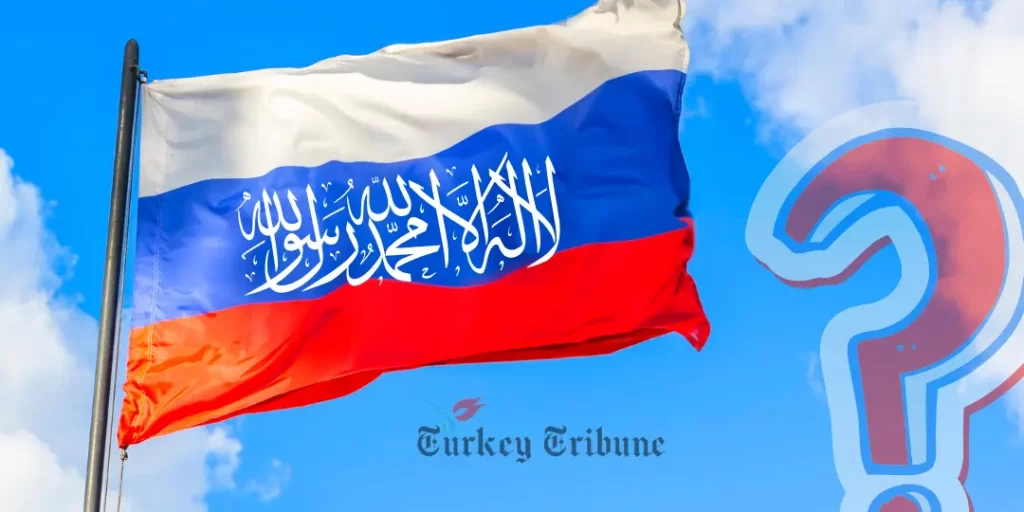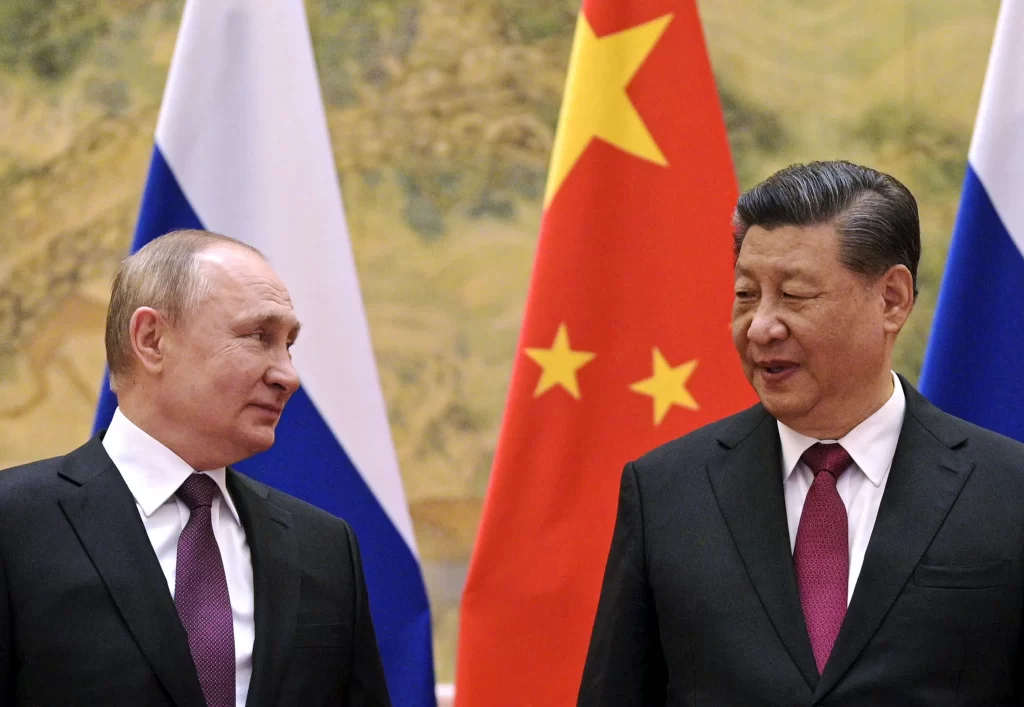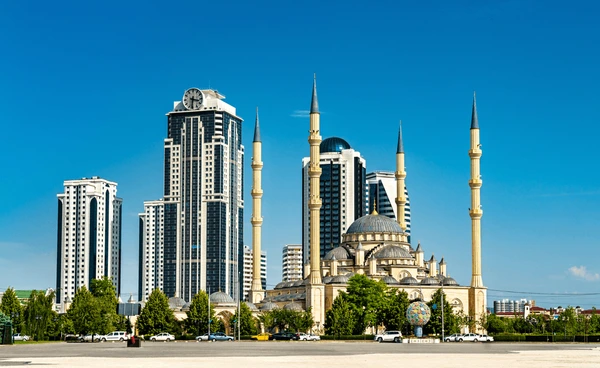‘The New Global Order Theory: Russia’s Islamic Shift and Global Impact’
(Written in English)
The Hypothetical Scenario of Russia’s Islamic Conversion
Imagining a large-scale conversion of Russia to Islam is an unusual and rarely discussed scenario in global politics. While Russia is historically tied to Orthodox Christianity, such a shift would have profound implications on its position in global affairs. Russia’s identity has long been shaped by its deep-rooted religious and cultural history, and a mass conversion to Islam would not only redefine this identity internally but also radically alter its relationships with key global powers like China, the US, and the European Union.

Although religion is often seen as a secondary factor in geopolitics, its influence on diplomatic relations, cultural alliances, and strategic partnerships cannot be ignored. If Russia were to embrace Islam, the ripple effects would extend beyond mere symbolism. Russia’s substantial Muslim population, concentrated in regions like Tatarstan and the North Caucasus, already plays a role in its domestic policy and foreign relations, especially with Muslim-majority nations. A full-scale religious shift, however, would push these dynamics to the forefront of Russia’s global interactions.
The question this article seeks to explore is not just how Russia’s internal politics would change, but how this religious shift might influence its standing with the world’s major powers. How would this affect Russia’s relations with China, given China’s treatment of its own Muslim minority? How would the US, historically cautious in its relations with Muslim-majority nations, recalibrate its strategy? And how would the European Union, grappling with its own internal debates about Islam, respond? These are complex, layered questions that could reshape global power dynamics in unexpected ways.
Russia-Islam Dynamics and Relations with China
Current Sino-Russian Strategic and Economic Relations
Russia and China share a complex, multifaceted relationship primarily based on strategic cooperation and economic partnerships. Over the last few decades, the two nations have strengthened their ties, focusing on energy collaboration, military cooperation, and counterbalancing Western influence, particularly that of the United States. The backbone of their relationship is pragmatic: Russia provides China with vast energy resources like oil and natural gas, while China’s economic powerhouse offers Russia a critical alternative to Western markets.

Though historically wary of one another, recent developments—such as their alignment in international organizations like BRICS and the Shanghai Cooperation Organization (SCO) show a significant shift towards deeper partnership. The relationship remains pragmatic, driven by mutual geopolitical interests, rather than cultural or religious affinities. This practical cooperation has, thus far, insulated their relationship from ideological differences, allowing them to maintain stable ties despite divergent internal policies.
How Religious Shifts Could Impact Sino-Russian Ties
A hypothetical Islamic conversion of Russia would undoubtedly introduce a new dynamic into the Sino-Russian relationship, potentially destabilizing the current balance. China’s internal policy towards its Muslim population, particularly the Uyghurs in Xinjiang, has already strained its relationships with some Muslim-majority nations. China’s treatment of its Muslim minority has drawn criticism from the global Muslim community, especially regarding allegations of forced assimilation and human rights abuses. Should Russia convert to Islam, its position on this sensitive issue would likely shift, and it may find itself forced to take a more critical stance on China’s Uyghur policies.
This religious transformation could complicate the two nations’ diplomatic ties, as China may perceive a Muslim Russia as a threat to its internal stability, especially if Russia were to voice concerns about China’s domestic policies toward Muslims. Furthermore, a Russia aligned ideologically with the broader Muslim world might seek closer relationships with other Muslim-majority nations, such as Turkey, Iran, and Saudi Arabia, which could weaken its current reliance on China as an economic and strategic partner.
On the other hand, this religious shift could offer Russia opportunities to leverage its new Islamic identity in diplomatic relations with China. For instance, Russia could attempt to act as a mediator between China and Muslim-majority countries, positioning itself as a bridge-builder and softening some of the tensions that exist between China and the Islamic world. However, the extent to which China would tolerate such mediation remains a significant question.
Recommended Article: Ankara TUSAŞ Explosion: Coincidence or a Warning?
Ultimately, while a conversion to Islam would not necessarily sever Sino-Russian ties, it would introduce a range of new complexities, altering the strategic calculations of both nations in ways that go beyond simple economic and military considerations. This shift would test the resilience of their relationship in navigating ideological and cultural differences in a rapidly changing global landscape.
A New Chapter in US-Russia Relations?
The potential conversion of Russia to Islam would create a seismic shift in its relationship with the United States. Historically, US-Russia relations have been characterized by ideological conflicts, power struggles, and strategic competition, dating back to the Cold War. Even in recent years, despite some limited cooperation on issues like counterterrorism, both nations have often viewed each other through a lens of distrust, particularly when it comes to military presence and influence in global affairs. The US has long positioned itself as a defender of Western democratic values and Christian cultural traditions, while Russia has increasingly aligned itself with nationalist and Orthodox Christian ideals.
If Russia were to convert to Islam, it would challenge the very foundations of this relationship, bringing in new cultural, ideological, and geopolitical factors. US foreign policy, historically uneasy in its relations with the Muslim world, would face a unique challenge in redefining its stance toward a Muslim-majority Russia. This change could lead to a recalibration of US strategies on multiple fronts, from military engagement to diplomatic policies and economic sanctions.

Some key questions would likely arise in Washington:
- Diplomatic Repositioning: Would the US need to rethink its long-standing policies that view Russia as a Christian power balancing against Muslim-majority nations in the Middle East?
- Impact on US-NATO Strategy: Could a Muslim Russia affect the US-led NATO alliance, especially considering the alliance’s role in conflicts involving Muslim-majority countries like Afghanistan and Iraq?
- Sanctions and Economic Policies: How would the US adjust its economic sanctions and trade restrictions, particularly if Russia aligns more closely with Muslim-majority nations in trade or energy policies?
- Terrorism and Extremism Concerns: Would the US intensify its focus on counterterrorism efforts, worried about the potential rise of Islamic extremism within Russia, despite the country’s state-driven control over religious expression?
- Human Rights and Religious Freedoms: Could the US push Russia on issues related to religious freedom, given its complex relations with Muslim-majority countries that have sometimes strained over human rights?

While the US would likely seek to maintain some level of engagement with Russia, a religious shift could complicate their already delicate relationship. Washington’s historical caution toward Muslim-majority countries, combined with its tense relationship with Russia, means that this transformation could create both challenges and new opportunities for cooperation, particularly in regions where Russia has a strategic foothold, such as the Middle East. This new chapter in US-Russia relations would not only redefine traditional diplomatic frameworks but also impact global security, trade, and alliances in unprecedented ways.
The European Union and a Muslim Russia
The conversion of Russia to Islam would undoubtedly send shockwaves through the European Union, but it could also open new pathways for deeper cooperation between Russia and Europe. The EU, home to millions of Muslims, has long grappled with questions of identity, integration, and coexistence within its borders. A Muslim-majority Russia could offer a unique opportunity for the EU to redefine its relationship with Islam on a global scale, particularly as it seeks to engage with diverse cultures and foster inclusivity.
Russia’s conversion to Islam could usher in a new era of dialogue between Moscow and European capitals. Historically, Russia’s relationship with the EU has been marred by tension, distrust, and conflicting ideologies. However, Islam, as a shared spiritual and moral framework, could provide a platform for bridging these divides. Islamic teachings emphasize values such as justice, social harmony, and the protection of human dignity—all principles that align with the EU’s foundational ideals of human rights and social welfare. This shared ethical ground could serve as a new basis for cooperation, particularly in areas like humanitarian efforts, global peace initiatives, and fostering intercultural understanding.

Potential Benefits of a Muslim Russia-EU Relationship:
- Strengthening of Diplomatic Ties: Islam, as a religion of peace and dialogue, could help reduce tensions between Russia and the EU. A Muslim Russia may prioritize diplomatic negotiations, peace treaties, and conflict resolution, aligning with the EU’s long-standing focus on peaceful diplomacy and multilateralism.
- Enhanced Cooperation on Immigration and Integration: Europe’s struggle with Muslim immigration and integration could be mitigated by a strong Muslim ally like Russia. A shared religious and cultural framework could facilitate more compassionate and effective policies on refugee resettlement, integration, and intercultural dialogue.
- Trade and Economic Collaboration: A Muslim Russia, potentially aligned with key Muslim-majority nations such as Turkey and the Gulf States, could form a new axis of economic cooperation with the EU. This could involve closer collaboration in areas like energy, infrastructure development, and sustainable trade initiatives rooted in shared ethical principles.
- Cultural and Religious Diplomacy: With a Muslim Russia, the EU could promote a more balanced and positive portrayal of Islam within its borders. Russia, with its influence, could help counter Islamophobia and foster a more inclusive narrative about Muslim identity in Europe.
In this light, Russia’s conversion to Islam presents an opportunity for the EU to reimagine its relationship with a key global power, moving beyond old Cold War mentalities and into a future of cooperation and shared values. This transformation could lead to a stronger, more peaceful Europe, built on mutual respect and an enriched understanding of Islamic principles that advocate for global justice and social harmony.

The Ripple Effect on Global Power Dynamics
A hypothetical conversion of Russia to Islam would have profound implications not only for its relationships with individual global powers like China, the US, and the EU, but also for the broader global power structure. Such a transformation would create ripple effects that could reshape alliances, disrupt established geopolitical strategies, and introduce new forms of cooperation between countries that have historically been on opposing sides of ideological divides. This scenario offers a fresh perspective on how religion, often sidelined in discussions of global politics, can serve as a powerful force for shaping international relations.
“These alliances could lead to the creation of a powerful bloc of Muslim-majority nations”
One of the most immediate effects of Russia’s conversion to Islam would be a potential realignment of its foreign policy, especially with Muslim-majority countries. Russia’s newfound Islamic identity could foster deeper alliances with nations across the Middle East, Central Asia, and Africa—regions where Islam plays a significant cultural and political role. Countries like Turkey, Iran, and Saudi Arabia, key players in the Muslim world, would likely become important partners for Russia as it seeks to solidify its standing in a new religious context. These alliances could lead to the creation of a powerful bloc of Muslim-majority nations, capable of influencing global trade, energy markets, and security policies in ways that few other alliances could achieve.
Turkey’s Role in a Muslim Russia’s Future
Turkey, as a strategically positioned Muslim-majority country with strong ties to both the East and West, could play a pivotal role in Russia’s post-conversion geopolitical strategy. Historically, Turkey and Russia have had a complex relationship, marked by both rivalry and cooperation. However, a shared Islamic identity could strengthen the bond between these two nations, particularly in areas where they already share common interests, such as energy cooperation through projects like the TurkStream pipeline, and regional security in the Black Sea and the Middle East.

Turkey’s role as a bridge between Europe and the Muslim world would make it an invaluable partner for a Muslim-majority Russia seeking to navigate its relations with both the EU and Muslim-majority nations. Furthermore, Turkey’s long-standing aspiration to be a leading voice in the global Islamic community could find new momentum with the support of a major global power like Russia. Together, Turkey and Russia could lead initiatives that promote peace, justice, and economic development across the Muslim world, fostering a new era of cooperation rooted in shared Islamic values.
Recommended Article: The Abolition of the Caliphate: A Missed Opportunity for Global Stability
Reshaping Global Alliances
A Muslim Russia would also likely impact organizations like the Shanghai Cooperation Organization (SCO) and NATO. While Russia is currently a key member of the SCO, a military and political alliance that includes China and several Central Asian countries, its Islamic conversion could complicate relations with China, as discussed earlier. However, this could also open the door for Russia to strengthen its ties with other Muslim-majority nations in the SCO, potentially shifting the organization’s focus toward issues that align more closely with Islamic principles.
On the other hand, NATO, traditionally a Western Christian-dominated alliance, would face challenges in adjusting to a Muslim-majority Russia. This shift could either push Russia further away from NATO or create new opportunities for collaboration on common security concerns, particularly in regions where NATO and Muslim-majority countries have overlapping interests, such as counterterrorism efforts.

A New Global Power Structure
The conversion of Russia to Islam would not just affect its direct relationships with global powers but could also lead to the emergence of a new global power structure. A bloc of Muslim-majority countries led by Russia, Turkey, and Saudi Arabia could serve as a counterbalance to the traditional Western-dominated order, promoting policies based on Islamic values of peace, justice, and solidarity. This new alliance could redefine global energy markets, given the combined oil and gas reserves of its member states, and introduce new economic frameworks based on Islamic principles, such as ethical trade and interest-free financial systems.
In conclusion, while the idea of Russia converting to Islam remains hypothetical, its potential impact on global power dynamics is vast. Such a transformation would not only reshape Russia’s foreign policy but also create new opportunities for alliances, cooperation, and dialogue across the Muslim and non-Muslim worlds. In this scenario, Islam would serve as a unifying force that transcends old ideological barriers, fostering a more just and peaceful global order.

Where Should Russians Learn About Islam?














